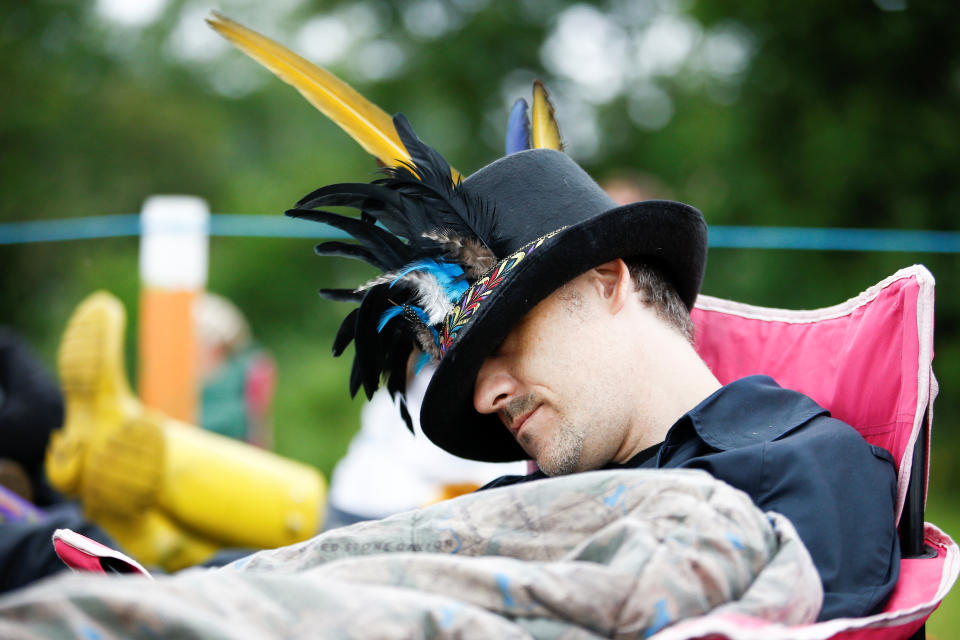Money problems keep most Americans up, but here's how to sleep better
More than half of U.S. adults lose sleep because they are worried about money, but doctors say there are a few simple things you can do to get some shut-eye.
A new report from Bankrate released Thursday found the biggest money stressor that keeps people awake at night is everyday expenses. “That’s alarming,” said Bankrate analyst Ted Rossman. “Because that’s just a basic need that a lot of people are struggling with.”
The report surveyed 2,504 adults and found 56% lose sleep over money-related stress and 32% cite worry about everyday expenses as the cause of an occasional bout of insomnia.
“We see this come up time and time again, there are just a lot of people that are very close to the edge living paycheck to paycheck,” Rossman said.
He points to last winter’s U.S. government shutdown as an example. Eight-hundred thousand federal employees stopped getting paychecks and as Yahoo Finance reported worried about some of the same issues covered in the new Bankrate survey. Among those issues are paying down credit card debt or keeping a roof over your head.
The Bankrate report found 18% of adults blame credit card debt for tossing and turning when they try to fall asleep. The same amount, 18%, worry about making a mortgage or rent payment. Worrying about educational expenses kept 11% of adults awake while 5% blamed stock market volatility.

Don’t lose sleep over it
Dr. Andrew Varga, MD, PhD, at Mt. Sinai Hospital’s Integrated Sleep Center in New York City said an occasional restless night is nothing to lose sleep over. “As a general rule of thumb if there is a life stressor that causes an issue for more than a month then this might be a chronic issue that warrants interventions,” he said.
Dr. Varga warns against changing your behavior when a sleepless night strikes. Watching TV or getting something to eat may seem like a good idea, but Varga said “These are things that you definitely should not be doing in the middle of the night” because over time they can become habits that prevent you from returning to a normal sleep pattern.
“For people who have insomnia keeping a rigid schedule is useful,” he said. “You should have a pretty dedicated bed time and a pretty dedicated wake time.”
If that doesn’t work, Varga recommends shortening the time you spend sleeping by either going to bed a little later or getting up a little earlier. “So the duration should be about seven hours or even less. I usually try to target something in the beginning that is between six and seven hours.”
Cut expenses or earn more
Having a plan to tackle the financial issues that cause stress can also help, Rossman said, adding that cutting expenses may be easier for most people than getting a second job and trying to earn more money.
“There are a lot of people paying $500 a month on new car payments. Could they drive a cheaper used car instead and bank the savings?” said Rossman. That may help alleviate the stress over saving for retirement, an issue that kept 24% of adults awake at night.
It isn’t about eliminating fun from your life, Rossman said, but finding a way to do things less expensively. “The nice thing about cutting on recurring expenses is that it has that 12-times benefit, it helps you each and every month,” he said. It also makes tackling other issues something you can sleep on.
Adam Shapiro is co-anchor of Yahoo Finance On the Move.
Read the latest financial and business news from Yahoo Finance
Fiverr stock soars after IPO, CEO promises it will make money
U.S. warns cryptocurrency exchange operators to comply with regulations
Follow Yahoo Finance on Twitter, Facebook, Instagram, Flipboard, SmartNews, LinkedIn, YouTube, and reddit.
